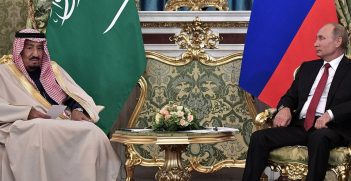Biden Administration Announcements Promise A Light Once Again Shining On Washington

Joe Biden’s presidency hints at a return to a world order led by US aspirations for international cooperation. Hope for this new direction in American foreign policy is further enhanced with Biden’s top picks for key positions within his administration.
It is perhaps fitting that America’s Thanksgiving celebrations should come at the end of the week which saw the denouement of the Donald Trump administration, with Emily Murphy, the administrator of the General Services Administration, carrying out a presidential order to implement the formal transition to Joe Biden’s presidency.
The move followed three weeks of Trumpian lunacy as, in state after state, the president’s bloated team of lawyers failed to convince judges that the election had been fraudulently won. The White House had claimed that some of those who had voted via post were dead, but painstaking checks proved they were alive. The most bizarre claim came from lawyer Sidney Powell, who told CNN – without a shred of evidence – that millions of votes on electronic voting machines had been switched from Trump to Biden by IT specialists financed by “Communist money.” Her claim proved too much even for many of the president’s staunchest supporters.
Throughout what historians may well regard as one of the darkest periods of American politics, President-Elect Biden gained admiration for his cool and collected manner. He undertook essential tasks for his transition without any of the benefits normally accorded a victor. Instead, he assembled a team of close advisers, bringing them – with strict social distancing and wearing masks – to his home in Wilmington, Delaware, where they planned how to combat the uncontrolled second surge of COVID-19 across the country. They also laid the foundation for a new administration in which Congressional politicians will work across party lines in the interests of the American public, a central campaign commitment.
President-Elect Biden announced the fruits of these efforts even before Trump lifted the barrier on an official transition, introducing several members of his top team. His picks for key jobs reflect diversity and experience, and his determination for the United States to re-join the international community, rejecting Trump’s “America First” jingoism. Biden said, “It’s a team that reflects the fact that America is back, ready to lead the world, not to retreat from it.”
Leading the charge will be the reliable Antony Blinken as Secretary of State, and John Kerry, who was Secretary of State in the Obama administration, as climate change tsar. Kerry was, Biden said, “someone with a seat at every table around the world” who “would be speaking for America on one of the most prescient threats of our time.” In a nod to Wall Street, Biden has nominated Janet Yellen to be the first female Treasury Secretary. The former chairwoman of the Federal Reserve during the Obama administration has the formidable job of repairing the American economy from the damage caused by COVID-19 at a time of deep national division. Biden also wants the US to be on the front foot in foreign policy, with professional diplomats rather than politicians acting as ambassadors. Republicans are saying the appointments mark “Obama Term 3,” a return to the old Washington swamp that Trump had cleared.
Now that Thanksgiving is out of the way and foreign policy wonks in Europe and most of Asia have finished celebrating the impending end to the Trump administration, the next big date for the diary is 21 January 2021. This will mark the day after Biden moves into the White House, when he intends to re-join the Paris Accord on climate change. He will convene a meeting of the world’s major carbon emitters, including China, to bring forward targets and lock in enforceable targets. The president-elect recently committed to making “massive, urgent investments at home that put the United States on track to have a clean energy economy with net-zero emissions by 2050.”
This will be good news for the Pacific islands and for many ASEAN countries, and it will increase the pressure on the Morrison government to change its ways. Kerry, who signed the Paris Accord on behalf of the Obama administration, will be on the case straight away. He will join British Prime Minister Boris Johnson in pressing Morrison to move more aggressively to combat greenhouse gas emissions and move swiftly away from fossil fuels to cheap and effective renewable energy.
Kerry’s appointment does not need to be confirmed by the Senate, and it is unlikely that even a Republican-controlled Senate would block either Yellen or Blinken, based on their track record and credibility. As a conviction multilateralist, Blinken will be welcomed in most of the world’s chancelleries.
Some commentators, notably from Australia, have suggested Biden will focus on Europe and NATO to the exclusion of the western Pacific nations. At first blush, that appears to be the case. Blinken describes Europe as a vital partner of the United States and has condemned Trump for his attitude to the European Union and his proposals to remove American troops from Germany. “It’s foolish, it’s spiteful, and it’s a strategic loser. It weakens NATO, it helps Vladimir Putin, and it harms Germany, our most important ally in Europe.” However, that does not mean Blinken will ignore the Asia Pacific. Far from it.
As vice president, Joe Biden played a major role in the Obama administration’s pivot to Asia, including negotiating American participation in the Trans-Pacific Partnership, a move dropped by Hillary Clinton in her 2016 presidential bid. Biden’s goal is for the Asia Pacific to be a region of stability governed by the international order that many of its nations, including Australia, seek. While dealing with climate change could become a source of friction between Washington and Canberra, Morrison will find common ground with Biden on China.
Trump has tried to depict Biden as likely to share the prime minister’s views on Beijing, but that will not be the case. Biden believes the United States should deal with its global rival differently, rejecting both Trump’s aggressive rhetoric and the indulgent optimism of Barack Obama and George W. Bush. Blinken put it thus: “We are in competition with China. We need to rally our allies and partners instead of alienating them, and then deal with some of the challenges that China poses.”
This echoes the president-elect’s belief that the US works best when it cooperates with its allies. Aside from China, military expansion in the South China Sea, trade, cyberattacks, intellectual property theft, unsatisfactory policy on carbon reduction, and human rights are all Biden concerns. Blinken will visit ASEAN and other Asia-Pacific capitals to discuss a coordinated approach to China and other regional issues.
Doing so will set the stage for Biden’s proposed Global Summit for Democracy to “renew the spirit and shared purpose” of the nations of the free world. It is a noble aim and, given the events of recent days, cannot come soon enough.
Colin Chapman is a writer, broadcaster, and public speaker, who specialises in geopolitics, international economics, and global media issues. He is a former president of AIIA NSW and was appointed a fellow of the AIIA in 2017.
This article is published under a Creative Commons Licence and may be republished with attribution.





